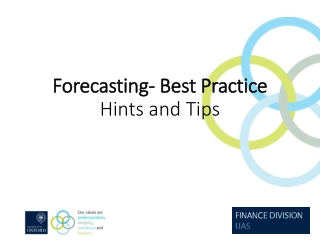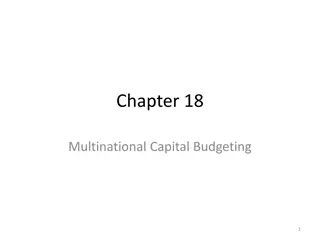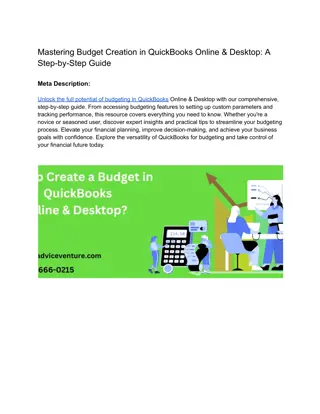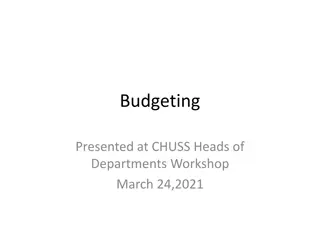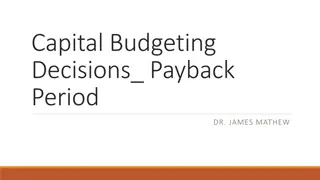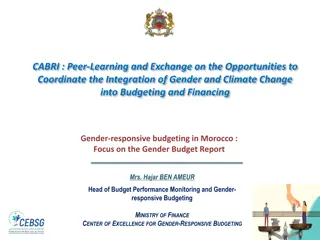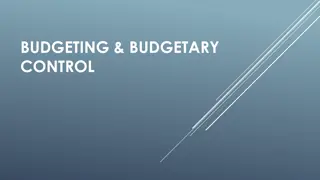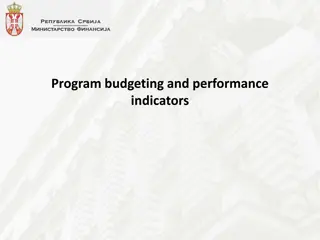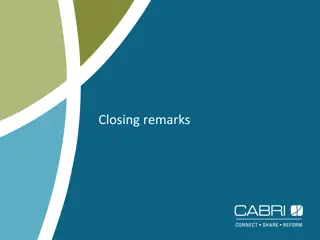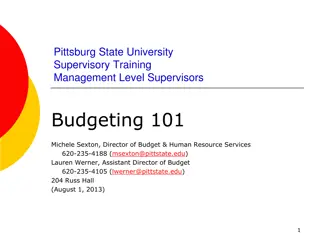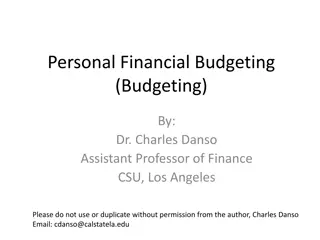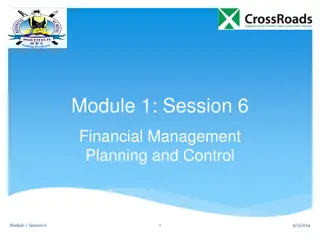Budgeting for Business Success
Discover the importance of budgeting for your business to ensure financial stability and growth. Learn how to create a business budget, differentiate between budgeting and bookkeeping, and when to start budgeting as a start-up. Find out why having a budget is crucial for managing expenses, reducing stress, and planning for the future.
Download Presentation

Please find below an Image/Link to download the presentation.
The content on the website is provided AS IS for your information and personal use only. It may not be sold, licensed, or shared on other websites without obtaining consent from the author.If you encounter any issues during the download, it is possible that the publisher has removed the file from their server.
You are allowed to download the files provided on this website for personal or commercial use, subject to the condition that they are used lawfully. All files are the property of their respective owners.
The content on the website is provided AS IS for your information and personal use only. It may not be sold, licensed, or shared on other websites without obtaining consent from the author.
E N D
Presentation Transcript
Entrepreneur Entrepreneur Local Learning Centers Local Learning Centers
SEMINAR 25: HOW TO BUDGET Creating and using a budget is not just for individuals or families who need to closely monitor their cash flows from month to month because money is tight. Having more control over your income and expenses allows you to ensure your hard-earned money is being put to its best by setting priorities. Almost everyone, even people with big paychecks and money in the bank, can benefit from budgeting. Therefore, budgeting is a simple and common task! How does this concept apply to your business, and how and when should you start budgeting?
Do I Need a Budget? A simple answer: YES When you budget your money wisely, you'll never lose sleep over financial issues again. Tracking expenses and following a plan makes it easier to pay bills on time, build an emergency fund, and save for significant expenses such as equipment upgrading or maintenance, unexpected expenses, and expansions. Overall, a budget puts your business on a secure financial footing for both the day-to-day and the long term. Set spending limits Find ways to pay down your debts Reduce costs and save more Reduce stress Feel in control of your money and your business. Making a budget and forecasting demand can help you:
What is the Difference Between Budgeting and Bookkeeping? Bookkeeping deals with recording, summarising, interpreting, and reporting financial transactions. Budgeting asks questions such as: Bookkeeping asks questions such as: - Where will our income come from? - Did we make a profit? - Where did we spend our money? - What money will we need to spend? - How much did we sell? - Will we have a viable business? To tell them apart, let's look at the roles. A bookkeeper s role is to record transactions and keep you financially organized, while accountants provide consultation and analysis and are more qualified to advise on tax matters.
When do You Start Budgeting as a Start-Up? The idea is to create different scenarios; you can see the result in your cash balance at the end of each month. This cash balance can give you information about your cash needs and how much you might need to borrow for working capital.
How to Create a Business Budget While every good budget has the same framework, you ll need to consider the unique budgeting aspects of your industry and business type. Inventory businesses: If you need to stock up on inventory to meet demand, the cost of goods sold will significantly impact your budget. Service businesses:If you don t have a physical product, focus on projected sales, revenue, salaries, and consultant costs. Seasonal businesses: Budgeting is important if your company has a busy or slow season. Because your business isn t consistent each month, a budget gives you a good view of ways to secure your cash flow during the slow season. E-commerce businesses: The main budgeting factor for e-commerce is shipping. Shipping costs (and potential taxes and duties) can significantly impact your capital. Do you have space in your budget to cover shipping to customers? Custom order businesses: When creating custom ordered goods, factor in labor time and cost of operations and materials. These vary from order to order, so make an average estimate.
How to Create a Business Budget Contd. To plan your budget (i.e., budgeting), you need to: 1. Look at your revenue: set goals! How much money is your business bringing in each month, and where is that money coming from? Be realistic, don t overestimate. Accurate forecasting is vital. In your second year and the next to come, your projected sales calculations should be based on historical sales figures or market trends, predicted growth, the economy, promotions, marketing efforts, etc. 2. Determine your variable costs: What are the direct costs of sales i.e., costs of materials, components, or subcontractors to make the product or supply the service? 3. Determine your fixed costs: What are the fixed costs or overheads? 4. Determine one-off costs: a cost that is paid once and not repeated often outside a company s usual activities such as purchases of computers or new equipment, registering fees, etc. 5. Determine your working capital. Maintaining a positive closing balance is vital. A recurrent negative Closing Balance means the company is experiencing budget planning and profitability problems.
Scenario: Monthly Budget, Kuujjuaq Colorful Scarves, Year Ended December 31st, 2022
Scenario Questions, Page 1 1. Look at your revenue: Kuujjuaq Colorful Scarvesestimates revenues included sales + sales taxes + loans and cash down. a. Sales were estimated based on anticipated growth in the first few months and adjusted based on busier seasons, such as the Christmas holidays. 2. Determine your variable costs (sold product cost): this represents the money spent on your inventory. 3. Determine your fixed costs, including sales fees (website+ promotions) and administration fees (postal charges, office supply, insurance, telecommunication, bank fees, paid sales taxes, income taxes, debt, and interest payment for the loan). Click here to view sales (money in) Click here to view costs (money out)
Scenario Questions, Page 2 1. Determine one-off costs: in January, the company acquired a new machine for the manufacture of scarves for 2800 $. 2. Determine the Exceeding balance: this is the difference between the Net revenues minus fixed costs and variable costs. 3. Determine closing balance: this is the amount remaining in your bank account. Click here to view sales (money in) Click here to view costs (money out)
Budgeting becomes an excellent forecasting tool, and it provides essential information such as liquidity issues: In March, Kuujjuaq Colorful Scarves could not cover the operating expenses (deficit) due to lower start-up sales. In April, June, and August, the company had to renew its stock; this expense weakened the cash flow (exceeding balance). To avoid this situation, the company could better distribute purchases of small orders over several months. Since the company got a loan from the bank and down payment (working capital), it could see its financial obligations and, after a year, still has 9 009 $ in the bank to reinvest in its company for upgrades and expansion.
TRUE OR FALSE A month of negative closing balance means that the company is bankrupt. True False True False
TRUE OR FALSE You should make a budget only when you are having financial difficulties. True False True False
GLOSSARY Click on the word to go back to that slide. - Monitor : To monitor means to continually observe and check the progress or quality of something over a period of time. - Forecasting : For small business owners, forecasting is the process of looking at past and present data, as well as marketplace trends, to predict the company's future financial performance. It enables you to gauge how much revenue you'll potentially earn in a particular period and plan for big expenses. - Closing balance : A closing balance is the total in an account at the end of a reporting period. A closing balance can be made up of many transactions that may impact an account during a reporting period. To investigate the reason why a closing balance is a particular amount, one must review the detailed transactions in an account that roll up into the closing balance.
Congratulations, you are correct! False; a single month with a negative Closing Balance indicates that the company is experiencing budget planning and profitability issues for that period. It will have to rebalance its budget and adjust expenses according to income. Click here to continue. Click here to continue.
Sorry. Please try again. Click here to try again. Click here to try again.
Congratulations, you are correct! Tracking expenses and following a plan makes it easier to pay bills on time and to build an emergency fund. It also helps you save for significant expenses such as equipment upgrading or maintenance, unexpected expenses, and expansions. Click here to continue. Click here to continue.
Sorry. Please try again. Click here to try again. Click here to try again.


